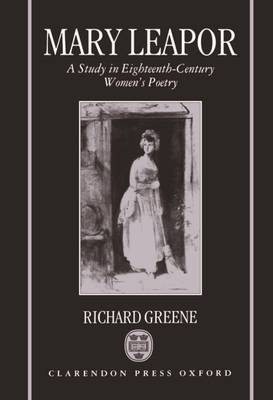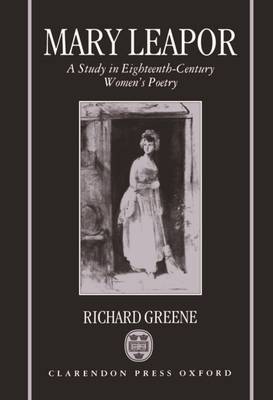
- Afhalen na 1 uur in een winkel met voorraad
- Gratis thuislevering in België vanaf € 30
- Ruim aanbod met 7 miljoen producten
- Afhalen na 1 uur in een winkel met voorraad
- Gratis thuislevering in België vanaf € 30
- Ruim aanbod met 7 miljoen producten
Zoeken
Omschrijving
Mary Leapor (1722-1746), a Northamptonshire kitchen maid, produced a substantial body of exceptional poetry which was only published after her early death at the age of twenty-four. This is a timely examination of the work of a poet who has remained almost forgotten for 200 years. Leapor is one of many gifted poets, mainly women and laborers, whose work stands outside the traditional canon of eighteenth-century verse. Richard Greene draws on extensive primary research to present substantial new information about Leapor's life. He discusses her protests against the injustices suffered by women and the poor, her attempts to gain an education, and the influence that illness and the expectation of an early death had upon her writing. Throughout, Leapor is seen in relation to both the mainstream poets of her time and to those whom literary history has consigned to obscurity. Mary Leapor: A Study in Eighteenth-Century Women's Poetry provides insight not only into the work of one neglected woman poet, but offers a sometimes surprising perspective on the literary history of the "Ages of Pope and Johnson."
Specificaties
Betrokkenen
- Auteur(s):
- Uitgeverij:
Inhoud
- Aantal bladzijden:
- 256
- Taal:
- Engels
- Reeks:
Eigenschappen
- Productcode (EAN):
- 9780198119883
- Verschijningsdatum:
- 24/06/1993
- Uitvoering:
- Hardcover
- Formaat:
- Genaaid
- Afmetingen:
- 140 mm x 216 mm
- Gewicht:
- 471 g

Alleen bij Standaard Boekhandel
+ 692 punten op je klantenkaart van Standaard Boekhandel
Beoordelingen
We publiceren alleen reviews die voldoen aan de voorwaarden voor reviews. Bekijk onze voorwaarden voor reviews.











